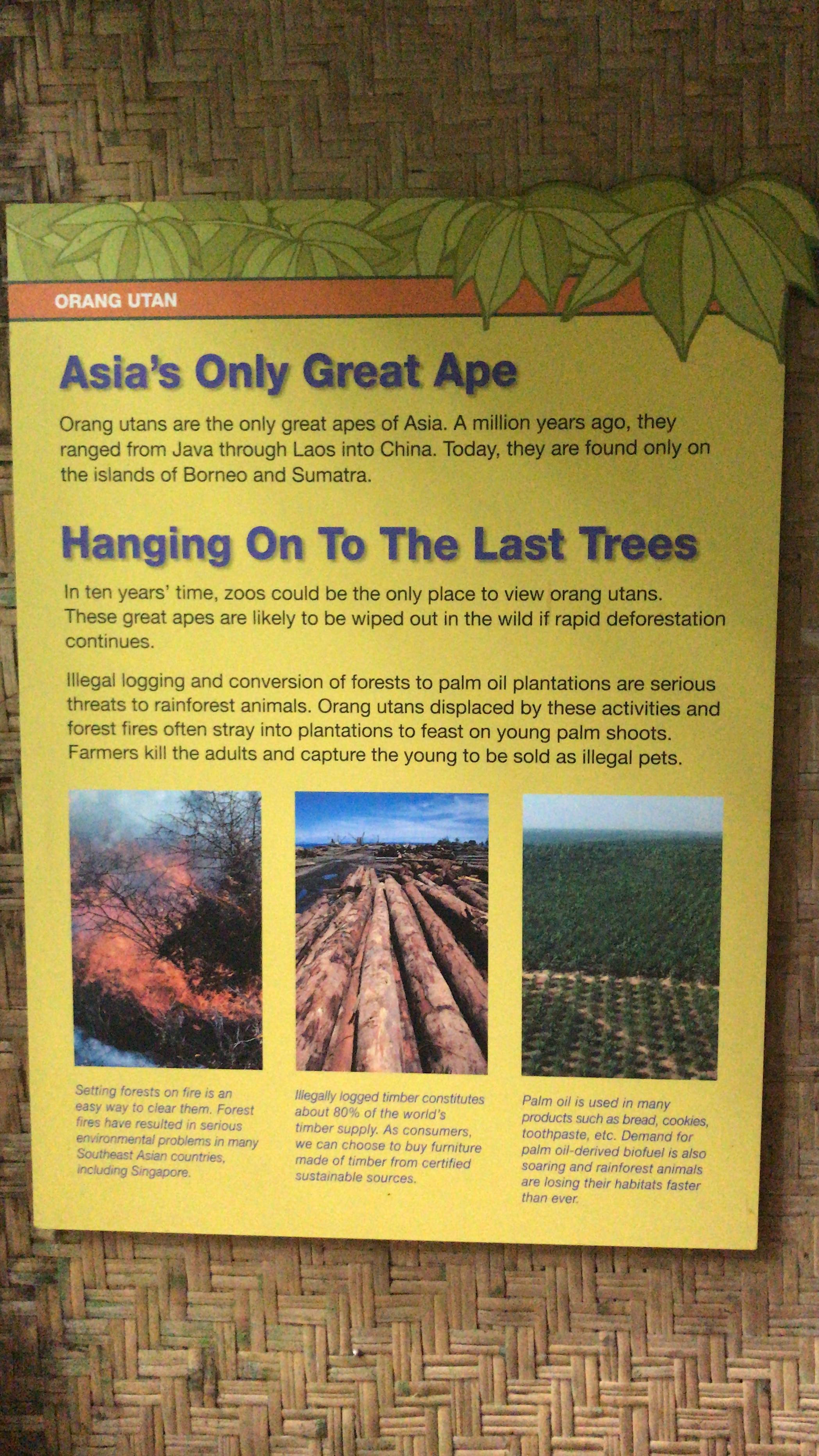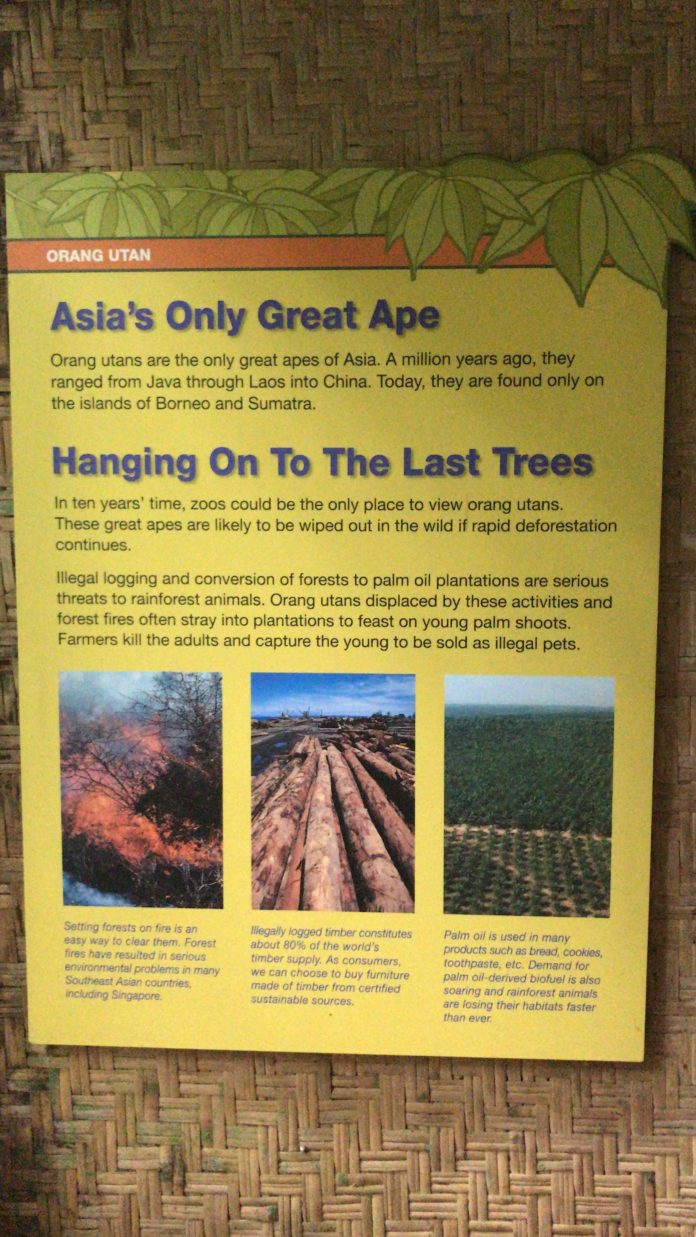SINGAPORE: Malaysian Primary Industries Minister Teresa Kok has accused the Singapore Zoo of putting up displays that shed a negative light on palm oil and called for countries in Southeast Asia to present a united front in supporting the industry.
When delivering her keynote address at the Singapore Dialogue on Sustainable World Resources on Thursday morning (May 2), Ms Kok noted that the zoo’s displays at its orangutan enclosure had damaged the image of palm oil producing countries in the region “despite progressive efforts towards sustainability and wildlife conservation”.
“In this case, Singapore Zoo acted possibly in haste and (was) reflecting emotions expressed by some ill-informed visitors,” she added.
In an immediate response to Ms Kok’s comments, Wildlife Reserves Singapore (WRS), which operates Singapore Zoo, said it advocates for sustainably produced palm oil, adding that boycotting the industry is not effective.

This exhibit at the Singapore Zoo highlights that the conversion of forests to palm oil plantations has threatened orangutans. (Photo: Amir Yusof)
A visit by CNA to the Singapore Zoo on Thursday afternoon found the displays explaining that conversion of forests to palm oil plantations is a serious threat to rainforest animals, such as the endangered Borneo orangutan species.
One of the displays read: “Palm oil is used in many products such as bread, cookies, toothpaste etc. Demand for palm oil derived biofuel is also soaring and rainforest animals are losing their habitats faster than ever.”
ASEAN COUNTRIES MUST STAND UNITED ON PALM OIL: TERESA KOK
In her speech, Ms Kok highlighted that Malaysia’s palm oil industry has contributed funds to wildlife conservation in Sabah to protect iconic species such as the orangutan, Borneo pygmy elephant and the sun bear.
The Borneo orangutans can be found in Sabah and Sarawak. (Photo: Amir Yusof)
She said the curators at the Singapore Zoo should take note of such efforts. “We plan to do far more in Sarawak and in peninsula Malaysia, these are part of our ongoing effort towards sustainable production systems,” she added.
Ms Kok also called for Association of Southeast Asian Nations (ASEAN) countries to show solidarity and “be supportive of one another”, especially on presenting facts on palm oil.
“If the EU (European Union) countries can stand united on assumptions of unsustainable production and consumption of palm oil… we as ASEAN should stand tall to fight against those who are unfair and have discriminatory judgements,” she said.
WE WILL CONTINUE WITH PUBLIC EDUCATION: WRS
In its email statement to CNA, Mr Mike Barclay, Group CEO for Mandai Park Holdings – the parent entity of WRS – said WRS believes that boycotting of the palm oil industry is not effective given the efficiency of palm oil production and its ubiquitous use.
“We recognise that palm oil is the highest-yielding source of vegetable oil and the palm oil industry creates stable employment for many people across the region,” he said.
Mr Barclay highlighted that WRS is an active member of the Roundtable on Sustainable Palm Oil (RSPO), an organisation that is committed to protect tropical rainforests that hold large stores of carbon and biodiversity, and are critical for millions of indigenous and local peoples who depend on forests for their livelihoods.
He said WRS applaud RSPO’s commitment to protect the high carbon stock rainforests.
“We trust that ensuring the consumption of certified sustainable palm oil can help minimise the negative impact of palm oil plantations on wildlife and their habitats,” he added.
Mr Barclay reiterated that public education is a key mission of all the parks operated by WRS in engaging the community and raising awareness about conservation issues.
“We will continue to communicate messages advocating the protection of wildlife and their habitats across all our channels, including animal exhibit interpretives, park posters and our website,” said Mr Barclay.
READ: Malaysia to ‘take advantage’ of ECRL deal to sell more palm oil to China: Mahathir
Malaysia is the world’s second biggest palm oil producer after Indonesia, and it relies on the crop for billions of dollars in foreign exchange earnings and hundreds of thousands of jobs.
In March, Malaysian Prime Minister Mahathir Mohamad said the EU risked opening up a trade war with Malaysia over its “grossly unfair” policies aimed at reducing the use of palm oil.
The comments came after the European Commission concluded that palm oil cultivation results in excessive deforestation and its use in transport fuel should be phased out by 2030.
Dr Mahathir had said that the EU’s increasingly hostile attitude towards palm oil was an attempt to protect alternatives that Europe produced itself, like rapeseed oil.
In Beijing last week, Dr Mahathir witnessed the signing of a deal for China to buy additional 1.9 million tonnes of palm oil from Malaysia over the next five years.





